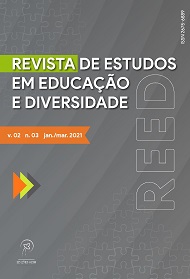MST TRAINING CONCEPTION: PEDAGOGICAL AND METHODOLOGICAL PREPARATION FOR THE COLLECTIVIZATION OF THE STRUGGLE
DOI:
https://doi.org/10.22481/reed.v2i3.8158Keywords:
Formation of Consciousness, Organization, Education, StruggleAbstract
The Brazilian Landless Workers Movement (MST) have its own conception of formation and training and the purpose of this article is to present and discuss the elementary basis of this processes. The MST Organization understand that everyone in the social basis of the movement must be trained to be able to face day-by-day class struggle. Our analysis is based on MST (2009) as well as on authors such as Iasi (1999), Santos (2007), Bogo (2011) and Marx (1975). Our discussion captures the conscience building as a constitutive process for MST, emphasizing the used tactics and methodologies. We also highlight the permanent challenges to maintain the process alive. It is clear that the movement training rely and is intrinsically attached to the current workers production and re-production of life conditions. This constitutive principle of MST is a permanent mobilization flagship and a fundamental element to intervene in the reality and consequently transform it. Therefore, the movement understand education itself as a constant transforming process driven to the building of a new society project. The MST accumulated experience on social movement training point out new education possibilities, strongly attached to the social participation and oriented to a new society preparation.
Downloads
References
BOGO, A. O MST e a Cultura. Cad. De Formação, n° 34. 2 ed. Edição TERRA, 2001. 93p.
_____________. Os desafios políticos atuais e a formação de quadros. Curso Realidade Brasileira, março de 2005.
_____________. A Consciência e a Disciplina. Fevereiro de 2008.
CALDART, R. S. O MST e a formação dos sem terra: o movimento social como princípio educativo. Estudos Avançados [online]. 2001, vol.15, n.43, pp. 207-224. ISSN 0103-4014 – Acessado em 20/07/2013.
_____________. Pedagogia do Movimento Sem Terra. 3. ed. São Paulo: Expressão Popular. 2004.
FREIRE, P. Extensão ou Comunicação? Tradução de Rosisca Darcy de Oliveira. Prefácio de Jacques Chonchol. 7 ed. Rio de Janeiro. Ed. Paz e Terra. 1983, 93 p.
GAIA, M. C.M. Agroecologia: a resistência do camponês e da camponesa Sem Terra. Rio Pomba. Monografia [Especialização em Agroecologia e Desenvolvimento Sustentável] – Centro Federal de Educação Tecnológica de Rio Pomba 2008.
IASI, M. L. Processo de consciência. São Paulo: CPV, 1999.
LÖWI, M. Ideologias e Ciência Social: elementos para uma análise marxista. São Paulo. Cortez, 1988.
MARX, K. & ENGELS, F. Manifesto do Partido Comunista. São Paulo. Expressão Popular, 2008. 70 p.
MARX, K. O Capital: crítica da economia política. 3. ed. v. 1. Rio de Janeiro: Civilização Brasileira, 1975. p. 201-224.
MST. Movimento Sem Terra. Caderno de Formação n° 37. Escola Nacional Florestan Fernandes. Guararema, SP; 2009. p. 90.
OLIVEIRA, A. A. de. A formação política do MST e as relações de trabalho em áreas de reforma agrária. Dissertação (Mestrado). Programa de Pós-Graduação em Educação. FaE/UFMG, 2012.
OLIVEIRA, A. A. de. Brigada Botocudos: potencialidades e limites. Monografia (Graduação). Curso de Licenciatura em Educação do Campo, FaE/UFMG. 2010.
SANTOS, E. L. dos. Juventude, formação política e identificação no MST. Revista Libertas Online, Juiz de Fora, edição especial, p.68 - 81, fev / 2007.
SAVIANI, Dermeval. Trabalho e educação: fundamentos ontológicos e históricos. In: Revista Brasileira de Educação. Jan. /abr. 2007, v. 12, n. 34, p. 152-180.
SILVA, R. M. L. da. A Dialética do Trabalho no MST: a construção da Escola Nacional Florestan Fernandes. Niterói: 2005. 320 p. Tese (Doutorado). Programa de Pós-Graduação em Educação. Universidade Federal Fluminense, 2005.
STEDILE, J. P.; FERNANDES, B. M. Brava Gente: a trajetória do MST e a luta pela terra no Brasil. São Paulo: Fundação Perseu Abramo, 1999.
Downloads
Published
How to Cite
Issue
Section
License
You are free to:
Share - copy and redistribute the material in any medium or format; Adapt - remix, transform, and build from the material for any purpose, even commercially. This license is acceptable for Free Cultural Works. The licensor cannot revoke these freedoms as long as you follow the terms of the license.
Under the following terms:
Attribution - You must appropriately give credit, provide a link to the license, and indicate if any changes have been made. You may do so in any reasonable way, but not in a way that suggests that you or your use is endorsed by the licensor.
There are no additional restrictions - You cannot apply legal terms or technological measures that legally restrict others to make any use permitted by the license.






